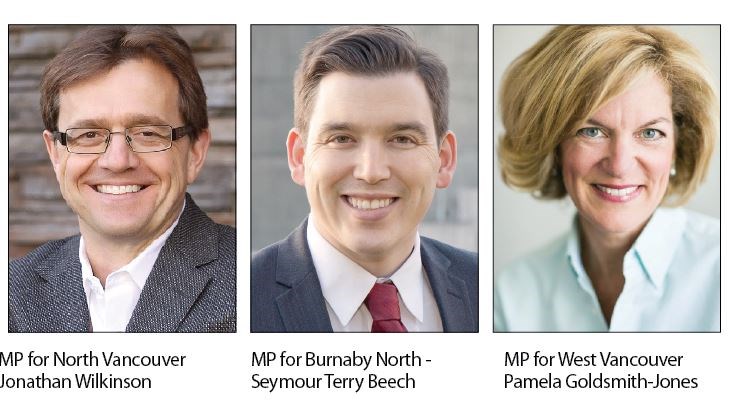They’re sorry. They’re disappointed. And to those voters hoping for a new voting system before the next federal election, they feel your pain.
That was the message from all three North Shore Liberal MPs following the news last week that the federal government is throwing in the towel on its election promise to bring about electoral reform before Canadian voters head to the polls again.
The Liberal government announced last week that it won’t be pursuing changes to the way Canadians vote, despite an election promise to do just that.
Prime Minister Justin Trudeau defended the decision in the House of Commons last week, saying there was no consensus among Canadians or politicians about whether the current first-past-the-post system should be scrapped or what it should be changed to.
“The fact of the matter is that I am not going to do something that is wrong for Canadians just to tick off a box on an electoral platform,” said Trudeau.
NDP leader Tom Mulcair called that a “massive political deception.”
Since then, North Shore MPs have weighed in on the about-face by their government.
“I understand a number of people being disappointed and to be honest I would count myself among them,” said North Vancouver MP Jonathan Wilkinson. “I was very much of the view that we should change the electoral system and I was pretty public about that.”
“A lot of people have expressed disappointment,” said Wilkinson. “I’ve heard from several people in the riding about that.”
But Wilkinson said changing the system would be difficult without agreement from at least one of the other major parties about which voting system would be better.
Many Liberals favoured a ranked ballot system, the NDP and Greens favoured proportional representation and the Conservatives didn’t favour any change unless it was approved in a referendum.
“If the Liberal Party simply decided on a change and ran it through with no support of the Conservatives or the NDP, most people would very legitimately say you’re just doing it to favour yourselves politically,” said Wilkinson.
He added most average Canadians “are not interested or invested in this issue.”
Pam Goldsmith-Jones, MP for West Vancouver Sunshine Coast Sea-to-Sky Country, echoed those comments, adding people in B.C. appear to be more interested in electoral reform than voters elsewhere in the Canada.
“We are the advocates for things that are not as self-evident elsewhere in the country,” she said.
She added there are some people in her riding who are “profoundly disappointed” in the decision to abandon electoral reform. “I apologize for that.”
Burnaby North-Seymour MP Terry Beech acknowledged there is disappointment among some of his constituents as well.
But he said “I also think there needs to be some flexibility” when “government realizes there is no responsible way to deliver on a promise despite its best intentions of doing so.”
Gerald Baier, a political science professor at the University of British Columbia, said there’s no doubt Trudeau broke an election promise.
Left-of-centre voters who cast ballots strategically for the Liberals based on that promise aren’t going to be happy, he said.
But Baier said the process wasn’t set up in a way that would lead to a consensus on how to change the voting system.
“If you go around and ask people ‘What is your favourite food at this buffet?’ are you going to get a majority view about any particular thing? Probably not,” he said.
Baier said a better idea would have been to set up a citizens’ assembly, such as the group that came up with a single transferable vote model, which went to referendum in British Columbia in 2005 and 2009.
Baier said because the Liberals left the issue to a committee of politicians under the direction of a junior minister, it isn’t surprising the process didn’t result in a clear direction.
“It’s essentially dead for now,” he said.



